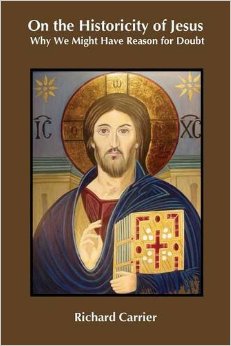The focus of my response will center on Carrier’s
- claim that a pre-Christian angel named Jesus existed,
- his understanding of Jesus as a non-human and celestial figure within the Pauline corpus,
- his argument that Paul understood Jesus to be crucified by demons and not by earthly forces,
- his claim that James, the brother of the Lord, was not a relative of Jesus but just a generic Christian within the Jerusalem community,
- his assertion that the Gospels represent Homeric myths,
- and his employment of the Rank-Raglan heroic arche-type as a means of comparison.
(Gullotta, p. 325. my formatting/numbering for quick reference)
Daniel Gullotta next addresses Richard Carrier’s discussion of the passage in Galatians that speaks of Jesus being “born of a woman”. If in the previous criticism Gullotta failed to grasp the “background information” status of Philo’s interpretation of Zechariah, this time he fails to point out to his readers that Carrier actually allows for Gullotta’s criticism and is willing to grant, for the sake of arguing a fortiori, that Gullotta’s interpretation is entirely correct. Why or how Gullotta failed to inform readers that Carrier made this concession is difficult to understand.
Readers have a right to expect that a review does not give a false impression about how the the reviewer’s criticism fits with the author’s argument.
Gullotta writes:
[Carrier] makes an unlikely claim that Paul in Galatians 3.29-4.7 is ‘speaking from beginning to end about being born to allegorical women’, and thus Paul meant that Jesus was born, in an allegorical sense, to Hagar. Carrier mistakenly links Paul’s usage of the story of Abraham and the birth of his sons by different women to Christ, claiming ‘Jesus was momentarily born to the allegorical Hagar, the slave woman, which is the Torah law (the old testament), which holds sway in the earthly Jerusalem, so that he could kill off that law with his own death, making it possible for us to be born of the free woman at last.’
This, however, is not validated by the text. . . . . There is no direct connection between the woman in Gal 4.4 and the women who bear the sons of Abraham in Gal 4.22-24. Paul’s statement that ‘this is an allegory’ appears in Gal 4.24, well after his earlier proclamation . . . .
Carrier explains that his interpretation of the passage is an attempt to approach it without preconceptions of the historicity of Jesus. Even so, I find myself siding with the standard interpretation of the passage as set out by Gullotta. What is important to note, though, is that whatever interpretation one embraces, the Greek word translated “born” does embrace the meaning of “made”. Certainly the phrase itself could and was used to refer to normal births but the fact remains that Paul’s earliest interpreters themselves disputed the exact meaning (see posts linked in the “Born of a Woman” archive).
Here is the passage that Gullotta overlooked. It is in Carrier’s concluding paragraph of his discussion of the passage, p. 582:
But since all this [Carrier’s allegorical interpretation of “born of a woman”] is not yet commonly accepted . . . I will argue a fortiori by saying [this standard explanation, the one argued by Gullotta] is 100% expected on minimal historicity. . . . So again, although I doubt it, this passage might also be twice as likely on historicity.
Gullotta has bypassed sixty-five pages of discussion of Paul’s statements about the activities and words of Jesus to zero in on a five page treatment of apparent exceptions without noticing that Carrier actually conceded Gullotta’s interpretation as acceptable.
So when Gullotta goes to lengths to point out the common understanding of Paul’s letters where his statements can well be interpreted in a way that “does not rule out” a belief in the historicity of Jesus, he is saying nothing more than what Carrier acknowledges and accepts in his own argument. The difference between the two is that Carrier is balancing those interpretations against the weight of other passages and information and not treating them as absolutist proof-texts when interpreted in the light of the gospels.
Readers unfamiliar with Carrier’s argument might be asking: If Gullotta’s interpretation is conceded by Carrier then does that not close the case and prove that Paul believed Jesus to be an earthly historical figure? The answer is “no” because even though one can interpret Paul’s words to mean that Jesus had a natural human birth the history of early Christian doctrinal disputes demonstrates that this was not the universal earliest interpretation of Paul. (Besides, although they are contrary to Carrier’s own “minimal criteria for mythicism”, there may be other reasons to see the evidence pointing to a celestial Christ who descends into the physical world in order to die without thinking of such a figure as genuinely historical.)
–o0o–
There are other oddities in Gullotta’s criticism of Carrier’s argument at this point. One such addition is his pointing to the passage in Romans that says Christ came from the seed of David and that therefore he could not be born allegorically of Hagar. Again, Gullotta has overlooked vital details in Carrier’s discussion that address just that point which included a discussion of a second allegorical birth.
–o0o–
Before leaving this particular criticism I cannot avoid dropping in a particular point that sometimes seems to be overlooked. Even if Paul did think of Jesus as appearing as a man on earth that tells us nothing about the “historicity of Jesus”; it only tells us about Paul’s belief.
Next in the series, argument #3.



 The monk normally places his hand on a man’s heart for the extra blessing but on a woman’s head for same; but this is a trans man undergoing hormone replacement treatment. As I alluded to earlier there seems to be a more easy acceptance of transgenders here in Thailand than one expects in Australia. (Nonetheless the above picture did cause a bit of a scandal even here.) Recollecting The Federalist article I spoke about earlier, I should add that there is nothing unusual about seeing a prostitute taking a few moments out to offer prayers and offerings at a shrine or temple. No-one there to respond with a command, “Go, and sin no more!”
The monk normally places his hand on a man’s heart for the extra blessing but on a woman’s head for same; but this is a trans man undergoing hormone replacement treatment. As I alluded to earlier there seems to be a more easy acceptance of transgenders here in Thailand than one expects in Australia. (Nonetheless the above picture did cause a bit of a scandal even here.) Recollecting The Federalist article I spoke about earlier, I should add that there is nothing unusual about seeing a prostitute taking a few moments out to offer prayers and offerings at a shrine or temple. No-one there to respond with a command, “Go, and sin no more!”








